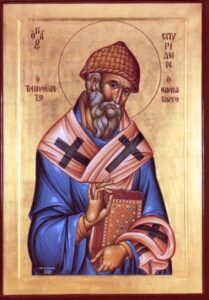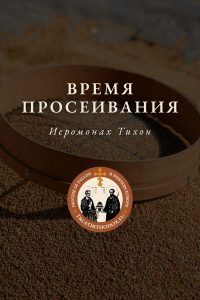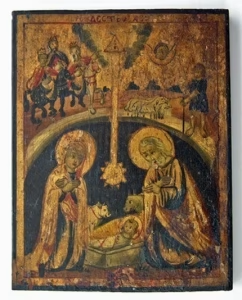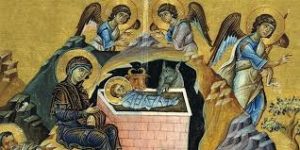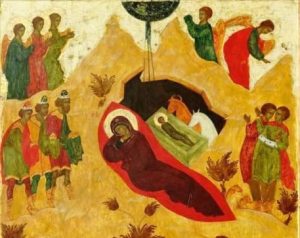BLESSED THEOKTISTA THE FOOL FOR CHRIST OF THE CATACOMB CHURCH
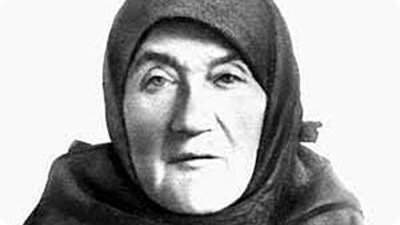
BLESSED THEOKTISTA THE FOOL FOR CHRIST
Commemorated Feb. 22 (t1936)
At the time when Archbishop Peter and Bishop Alexis (Hieromartyr Alexis Bishop of Kozlov (Bui) and Administrator of the Diocese of Voronezh – see his epistle here) were in Voronezh, a remarkable holy woman lived there, a fool for Christ, the blessed Theoktista Michaelovna.
The following two accounts come from two former residents of Voronezh, who personally knew the blessed one. The first, Archimandrite Mitrophan of St. Tikhon of Zadonsk church in San Francisco, spiritual son of the late wonderworker Archbishop John Maximovitch, told us the following:
It is difficult for a man to drive pride away from himself, to kill it. Human nature does not endure accusations and will always try to defend itself, to answer the accusation, even if it is correct. But the path of fools for Christ is a special one, the straightest one to God. They delight in hurting their pride. Theoktista Michaelovna deliberately drew persecutions on her self; many mocked her, hated her, and even beat her.
Who she was or where she came from —no one knew. It was said that she had been the wife of a high-ranking naval officer who died in the Russo-Japanese War (1904-1905), and that after this tragedy, becoming disillusioned in the solidity ‘of earthly life, she directed the gaze of her heart on high and took upon herself the exploit of foolishness for the sake of Christ. God rewarded her with a gift of clairvoyance with which she helped her suffering neighbors.
She was small of stature, skinny, worn out, with noble features in her face. She lived in the Voronezh Monastery of St. Alexis until it was closed (1931), and then took shelter with various people. She had literally “nowhere to lay her head.” She lived from time to time also in Novocherkassk, where she was very respected. It is said that she was received there by the Ataman (General) of the Don Cossacks; despite the armed guard around his house, she went everywhere freely, even to his private rooms. It was not for nothing that she was comforting people in Novocherkassk, for there were frightul catastrophes there; the town was almost entirely wiped out by the communists because the Cossacks had been a great support for the Tsarist government arid were suspected to be a threat due to their freedom-loving spirit. Both in Voronezh and Novocherkassk she had her own circle of people whom she would visit.
I knew her from my childhood. I remember how one time my mother brought me to the Monastery to visit her. We had tea in her quarters, and she herself waited on me and poured tea.
In Voronezh, there was an outstanding pastor, Archpriest Mitrofan, who greatly respected her and received her with great honor. He also died as a martyr in 1931.
She had a special appearance. She would wear soldier’s boots of the largest possible size, always leaving the laces untied. She would walk intentionally through puddles; the boots would become filled with water and she would keep right on walking.
She had a cane — a stick with a top on it, just a dry branch, and she would always take this stick with her. But always her noble, aristocratic origin was apparent. She would walk and be swearing a blue streak — but at the same time she would be looking with the kindest eyes. While walking she would close windows along the street with the stick. She was a noisy one. She loved me very much and often visited me.
Theoktista Michaelovna’s most striking gift was that of clairvoyance, which she manifested in her last years with special clarity. Here are some cases which I personally witnessed.
1. It was already the frightful Soviet times, the 1920’s. My father was a priest and I was afraid for him. After a long separation from him, I somehow managed to come and stay with him. I greatly rejoiced at meeting my relatives again. One morning Theoktista Michaelovna sent the woman who served her to demand that I leave my father immediately and come to her. I did not want to do this at all, since the times were dangerous and I had come for a short time.
She went away and after some time came back with the same command from Theoktista Michaelovna. This happened three times at short intervals, until I finally went. I was thinking: “What can be so urgent?” But she was just sitting by the samovar and, in the calmest way, just as if nothing had happened, she poured some tea and offered refreshments, and conducted a quiet conversation on the weather, and inquired how I was getting along. I had to humble myself and submit.
In an hour my mother came in tears: it turned out that no sooner had I obeyed and gone to Theoktista Michaelovna than our house had been surrounded and after a thorough search my father had been arrested. Despite all attempts, I was never able to find out anything more about his fate. If I had been home they would have taken me too — Theoktista Michaelovna’s clairvoyance saved my life. Then she took on a totally different air and advised me to leave the city as quickly as possible.
2. The next incident concerns the death of my mother. I loved my mother very much and suffered terribly when she died. I was always repulsed by alcoholic beverages and never had any desire for them. But when I heard that my mother had died, in my grief I was so outraged at all the inhuman conditions of the Soviet daily struggle that surrounded me that out of despair I couldn’t endure it any longer, and I went out and got drunk — so badly that I barely managed to get home to my apartment. Theoktista Michaelovna had a certain chaste woman of high education who devoted her whole life to the blessed one; she was called Anna Vasilievna. And so I wrote a letter to this Anna Vasilievna about my great sorrow over my mother’s death and asked that she inform Theoktista Michaelovna that my mother had died. And soon I received a letter from Anna Vasilievna where it was written: “Theoktista Michaelovna asks me to tell you that she cannot stand drunkards.” And so, in her clairvoyance, she had seen what I was doing.
3. I was working in Orel, where I had a temporary out-of-town job. When it was discovered that I was the son of a priest, they kept back my pay; this continued for several months. I had no money, and my family was very concerned about what I should do next.
I wrote a letter to Anna Vasilievna for Theoktista Michaelovna. In a few days, I received a reply: “Theoktista Michaelovna asks that you be told that she has made arrangements for you to be paid.” At this time I was in the town of Eletz.
I regained hope and went to the telephone station to call the pay office in Orel and to find out what the situation was with regard to my payment. And they said: “Where are you? We have been searching for you to pay you.” And I received everything in full, as I never had before. And so dear Theoktista Michaelovna had indeed “made arrangements.”
4. Once I was walking with Theoktista Michaelovna on the street, and a well-dressed young woman, full of health, was coming towards us. Evidently something had been revealed about her to Theoktista Michaelovna, because all of a sudden she hit the woman on the back with all her might, and then added a strong, uncensored word, apparently corresponding to her secret vice. The woman froze on the spot, but then continued on her way, since she apparently knew what she was being punished for.
Anna Vasilievna related that Theoktista Michaelovna did not sleep nights, but would spend them in prayer and vigil. When she went visiting she would pretend to pick insects off herself and kill them, and all the time she would scratch. Of course, people judged her for this. When she was with outsiders, she would often begin to speak all manner of nonsense, and sometimes would spit with an oath. But as soon as the outsiders would leave, a coherent conversation of a clairvoyant eldress would begin. She had a remarkable mind and a refined way of expressing her thoughts and feelings. It was apparent she was well-bred.
There was a great public square in Voronezh; on one side of it were the buildings of the Party’s Regional Committee and the Regional Executive Committee, and here there were monuments to Lenin and Stalin. Chekist guards were standing everywhere. Once she went up to these monuments and in front of everyone relieved herself; a puddle formed. She was immediately taken to Cheka headquarters, and there, in the Chief’s office, she made an even bigger mess right on his desk with all its papers. She was detained and then released as abnormal.
She had a friend Anisia, who very much loved her. Once this Anisia became ill and was preparing to die since no one could help her. Theoktista Michaelovna came to her and was told that Anisia was dying. “She’s pretending,” replied Theoktista Michaelovna, then went up to her, took her by the hand (and it was evident that she was really dying) and said: “Aniska, get up!” The latter instantly got up and began to prepare a meal for them, and all her disease was finished. This was in Voronezh.
A certain woman was subjected to a search by the police. She had a small store of money which she had hidden in a purse on a shelf. Suddenly the police came and the search began. Mentally she cried out for help:
“Theoktista Michaelovna, save me!” The one conducting the search touched the purse but saw nothing. He moved the whole buffet and all the shelves but didn’t find the money. Another testimony of Theoktista Michaelovna is given by a spiritual daughter of Archbishop Peter (Zverev) in Voronezh in the 1920s; she is now a nun residing in a California convent, Mother X.
I see her, the blessed Theoktista Michaelovna, before my eyes as if it were yesterday, although such a long time has passed since I saw her last in the city of Voronezh. She was of short stature, dressed in a long skirt and a coat of some dark, ugly color; on her head were many heavy kerchiefs, as though there were something wrong with her, or she were sick. She didn’t walk on the sidewalk, but mostly right on the street. She was always accompanied by some woman, perhaps a nun or a novice from the Protection Convent of the Mother of God where the blessed Theoktista lived amidst the remaining sisters who had not yet been arrested and banished into exile. The Convent had been closed by the Soviets long before, and had been turned into a so-called “workers’ village,” its houses rented out to laymen.
Theoktista Michaelovna lived in one of the cells of the Convent. Since laymen lived there now, and the school children were indoctrinated with communist propaganda, the blessed one was often seen being followed by a band of boys — young hoodlums. Usually she would disregard them, but sometimes she would stop, turn to them and say something to them. We saw her from afar, for to come close to her was a bit risky, since she was known to all to be just crazy. There were families which she visited, and perhaps she would stay sometimes with some of them. She was known to all the older residents as a holy woman and was highly respected.
When Bishop Peter of Voronezh was arrested by the GPU on November 10/23, 1925, his flock suffered bitterly over the separation from him and appealed to blessed Theoktista. “Will Vladika return soon?” they asked; “when will Vladika come?” She replied: “He will come when we’re eating meat.” And in fact, her words were fulfilled precisely; the GPU did not detain him long, and he returned home, arriving in Voronezh in time for the funeral of Metropolitan Vladimir of Voronezh on December 28, during the fast-free week after the feast of the Nativity of Christ.
On February 2, 1926, Bishop Peter was raised to the rank of Archbishop of Voronezh, and he began to live then in a small house not far from the St. Alexis Monastery. Here Theoktista Michaelovna constantly visited him — evidently, he was a friend of the blessed one. She would go straight to his cell and sit on his bed, where she would wait until Vladika would send away those who were constantly coming to him. She would call Vladka always by his first name and patronymic.
I also remember that in the upper church of the St. Alexis Monastery, dedicated to the Resurrection of Christ, there were two wonderworking icons of the Mother of Gcd: the “Life-giving Fount” on a high place on the right side, to which little steps led with a metal railing, and at the same elevation on the left side, the Mother of God “of Three Hands.” One day every one in the church was very upset at the behavior of Theoktista Michaelovna:
She got up on the high place to the icon of the “Three Hands” and stood with her back to the icon and began to bawl somebody out with some rather crude language. A short time later some thieves broke into the sacristy, sawed through the iron grating in the window, and stole something valuable. Then people understood that this act of hers referred to those evil-doers.
It was said that if she gave you bread, it was a good sign. People tell how once she was drinking tea at the place of one of the sisters in the Convent, when suddenly she leapt up and poured water from a dish out the window into the yard; at this very time someone nearby had a fire in a chimney and Theoktista Michaelovna was “putting out the fire” by this gesture.
Once she refused to take a bread-roll from one woman, saying “You will need it yourself; you will live for so-many days (she gave the number) without anything else — you will have nothing else to eat.” This happened just as she said.
The righteous Theoktista saw the rapid liquidation of the Orthodox churches and monuments of Voronezh in the 1930’s, which was only a part of the satanic program that was conducted all over the much-suffering Russian land, to the appalled outrage of almost the whole Russian people. The reign of terror took such proportions that people thought some madmen had gotten loose and seized the reins of government. Thousands of people were being arrested at random and thrown into prisons without any idea why. Professor P. Kusakov of South America, then a young man, who still remembers the blessed Theoktista well, tells us that it was like a psychotic nightmare, after which people became stupifled and indifferent to everything. Those few who remained free had only one thought: how to survive and take care of their shattered close ones. In addition to all this, a man-made famine was raging all over the southern region, which had always been the most fertile part of Russia, when thousands of innocent people died from starvation.
All this the blessed Theoktista saw well and co-suffered with the remaining Christians. By the mid-1930’s all churches were closed, levelled by dynamite or turned into factory storehouses.
Christianity went deep under ground and the few faithful could steal away to church services only deep in the night. The heart of the blessed one, which inspired so many good deeds for her neighbors, could not endure any longer. One day blood rushed to her throat, and on February 22, 1936 (OS.), Theoktista Michaelovna died. It was said that before her death she dressed all in white to meet her Brdegroom, Christ, and died in the Convent. She was buried in the cemetery outside the city and her memory was erased from Voronezh. But the Christian conscience bears her image in loving hearts throughout the world, wherever there is knowledge and understanding of Russia’s Catacomb Saints.
Sources: Poisky’s Russia’s New Martyrs, Vol. II: Memoires of Rev. Sergei Shukin, Archimandrite Mitrofan, Nun Xenia, and Peter Kusakov.

